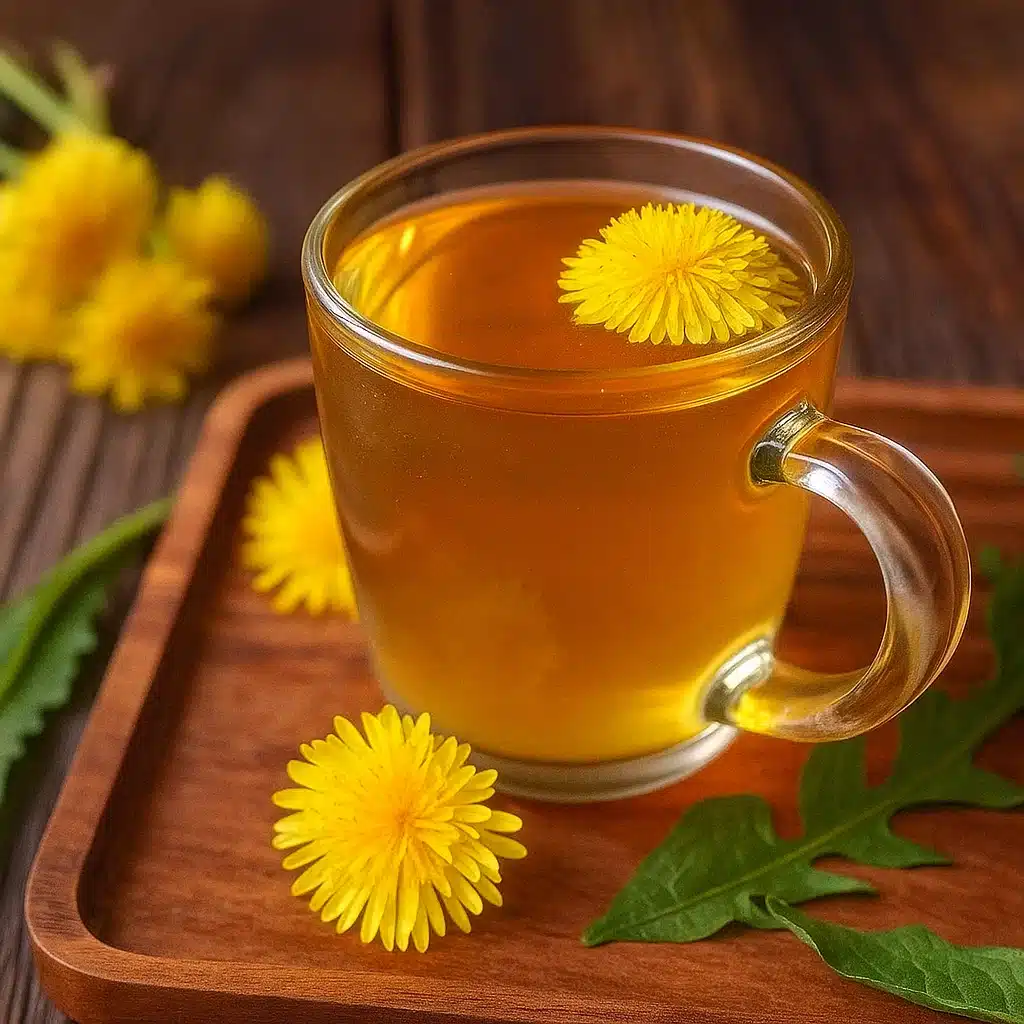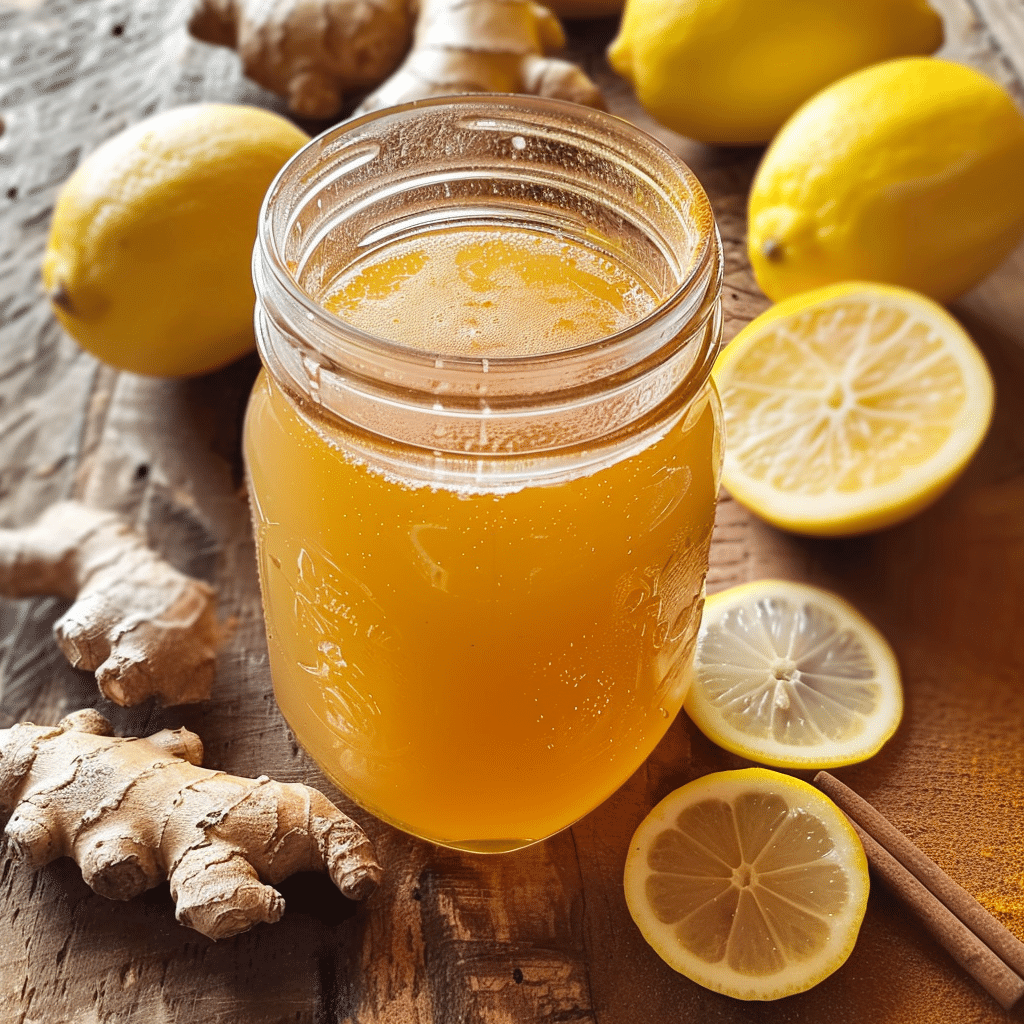This simple dandelion tea recipe is a natural way to support digestion, reduce bloating, and promote healthy weight loss. Made from the root or leaves of the dandelion plant, it’s a caffeine-free herbal tea packed with minerals, antioxidants, and detoxifying compounds.
Whether you’re looking to replace coffee, boost liver function, or enjoy a gentle cleanse, dandelion tea delivers results—without artificial ingredients or side effects.
Want more? Find out great ideas like Natural Weight Loss Drink Recipes where dandelion tea stands out as a powerful detox drink.

Table of Contents
Introduction to Dandelion Tea & Its Role in Natural Weight Loss
What is Dandelion Tea?
A good dandelion tea recipe starts with understanding the plant behind it. Dandelion tea is an herbal drink made from the flowers, leaves, or roots of the Taraxacum officinale plant—better known as dandelion. While many see it as a pesky weed, herbalists and natural health lovers know better.
Depending on what part of the plant you use, a dandelion tea recipe can take on different flavors and benefits:
- Dandelion leaf tea offers a light, slightly bitter taste and supports kidney function.
- Dandelion flower tea is mellow, floral, and high in antioxidants.
- Dandelion root tea, especially roasted, is rich and earthy—often used as a caffeine-free coffee alternative.
With the right preparation, a basic dandelion tea recipe becomes a powerful wellness drink that supports digestion, reduces water retention, and helps your body detox naturally.
Why Dandelion Tea Fits into Natural Weight Loss Drink Recipes
When people think of weight loss drinks, they often overlook teas that actually support the body’s natural processes. That’s where this dandelion tea recipe shines. It helps flush out toxins, reduce bloating, and stimulate digestion—all of which support a healthy metabolism.
Let’s break down what makes a dandelion root tea recipe ideal for weight loss:
- Natural diuretic: Helps release excess water weight
- Supports liver detox: A clean liver processes fat more effectively
- Boosts bile flow: Aids digestion and nutrient absorption
- Contains minerals: Potassium and magnesium promote balance and reduce cravings
When combined with other natural weight loss drink recipes, dandelion tea becomes part of a smart, clean lifestyle choice. It’s free from caffeine, sugars, and artificial ingredients—just natural, plant-based wellness in a cup.
Whether you drink it warm in the morning or iced in the afternoon, sticking to a simple dandelion tea recipe is a sustainable way to support your health goals.

Dandelion Tea Recipe
Equipment
- 1 Medium saucepan For simmering the tea
- 1 Strainer To remove root particles
- 1 Stirring spoon For combining ingredients
Ingredients
- 1/2 tsp Dried dandelion root Or fresh, cleaned and chopped
- 2 cups Water Filtered preferred
- 1 stick Cinnamon Optional
- 1 tsp Fresh ginger Optional, minced
- 1 tsp Vanilla extract Optional
- 1 tbsp Maple syrup Optional, to sweeten
- 1 tbsp Butter or cream Optional, for added creaminess
Instructions
- Add dandelion root to a medium saucepan over medium heat.
- Toast gently for 3–5 minutes if preferred (optional).
- Pour in water and add cinnamon or ginger if using.
- Bring to a boil, then reduce to a simmer. Let simmer uncovered for 30 minutes.
- Strain the tea into mugs.
- Add maple syrup, vanilla, or cream to taste.
- Serve hot or over ice.
Notes
- You can skip toasting if you prefer a lighter flavor.
- Dandelion tea can be stored in the fridge for up to 2 days.
- Always ensure your dandelion roots are clean and unsprayed.
- Great to drink before meals to improve digestion and reduce bloating.
Nutrition
Key Health Benefits of Dandelion Tea
Detoxification and Liver Support Explained
One of the most powerful reasons people turn to a dandelion tea recipe is its natural detox effect. Dandelion root contains compounds like taraxasterol and inulin, which help support liver function. The liver is your body’s built-in detox system—flushing out waste, filtering blood, and regulating fat digestion. Drinking dandelion root tea stimulates bile flow, which helps the liver remove toxins more efficiently.
If you’re looking for a gentle daily cleanse without harsh chemicals, a warm cup of herbal detox tea made with dandelion root is a smart, safe choice.
Diuretic Effects and Reduced Water Retention
Another key benefit of a consistent dandelion tea recipe is its natural diuretic properties. Dandelion leaves and roots both encourage the kidneys to release extra water and sodium. This makes it excellent for relieving bloating or puffiness caused by water retention.
Instead of turning to over-the-counter water pills, many people use dandelion root tea as a natural way to reduce swelling and feel lighter. Plus, it replenishes your body with potassium—unlike many synthetic diuretics that deplete it.
Support for Digestion and Gut Health
Dandelion tea isn’t just good for detox—it also promotes better digestion. The bitter compounds in dandelion root activate digestive enzymes and stomach acid, helping your body break down food more efficiently. That’s why drinking a cup before meals can reduce gas, ease constipation, and support nutrient absorption.
Roasted dandelion tea recipes also contain inulin, a prebiotic fiber that feeds the good bacteria in your gut. A healthier gut means less inflammation and better immunity.
Rich in Antioxidants and Minerals
Every time you brew a cup of this dandelion tea recipe, you’re sipping in a range of vital nutrients. Dandelion root is rich in:
- Potassium (supports heart and fluid balance)
- Iron (helps prevent fatigue)
- Calcium and magnesium (essential for bone health)
- Antioxidants like beta-carotene and polyphenols
These compounds help fight oxidative stress and may reduce the risk of chronic inflammation-related issues. So beyond just detoxing, a daily dandelion root tea recipe may help boost your long-term health.
Types of Dandelion Tea You Can Make at Home
Roasted Dandelion Root Tea vs. Raw Root Tea
When searching for the best dandelion tea recipe, you’ll notice there are two main versions: roasted and raw. While both come from the same root, the difference lies in flavor and potency.

- Roasted dandelion root tea has a deep, toasty flavor similar to coffee. It’s perfect if you’re looking to cut caffeine but still want that rich taste.
- Raw dandelion root tea is more bitter and herbal. It’s stronger in prebiotic inulin and has a more traditional detoxifying effect.
Both versions of this herbal detox tea support digestion and liver health, but the choice depends on your personal flavor preference and goals.
Dandelion Leaf Tea and Its Unique Benefits
Not every dandelion tea recipe uses roots—some rely on leaves. Dandelion leaves are known for their powerful diuretic properties, helping the body release excess water and reduce bloating.
The tea made from leaves is lighter in taste, often grassy or slightly bitter. It’s ideal if you’re looking for a mild, everyday natural detox tea without the richness of root-based recipes. You can even combine leaves with roots for a full-spectrum blend.
Cold Brew vs. Hot Brew Dandelion Tea
While the traditional dandelion tea recipe uses a hot simmering method, cold brewing is also gaining popularity. Each method has its perks:
- Hot Brew: Unlocks deeper flavors, perfect for roasted dandelion root. Best when consumed warm for digestion.
- Cold Brew: Offers a gentler flavor and is great for warm weather. Steep overnight in cold water to preserve more antioxidants.
So whether you’re cozying up with a hot mug or sipping iced dandelion root tea on a summer day, there’s a brew method that fits every lifestyle.
Dandelion Coffee Alternative: What Makes It Different
If you’re searching for a coffee substitute, a roasted dandelion tea recipe might be your answer. With its earthy notes and dark color, it mimics coffee without the caffeine crash or acidity.
Unlike traditional teas, this version is blended thicker and sometimes enhanced with ingredients like chicory, cinnamon, or coconut cream. It not only satisfies your taste buds but also supports digestion and natural detox.
Many people use this type of dandelion tea as a “morning ritual drink” to reduce dependency on caffeine while still enjoying a bold cup.
Step-by-Step Dandelion Tea Recipe
Ingredients Needed for the Best Dandelion Tea
Crafting the perfect dandelion tea recipe starts with selecting the right ingredients. You can use fresh or dried dandelion roots, and even add spices or natural sweeteners for extra flavor.
Here’s what you’ll need:
| Ingredient | Quantity | Notes |
|---|---|---|
| Dried dandelion root | 4½ teaspoons | Or fresh root (washed, chopped, and dried) |
| Water | 2 cups | Filtered preferred |
| Optional flavor boosters | To taste | Cinnamon stick, vanilla extract, ginger, maple syrup, butter or cream |
Optional additions make a huge difference in taste—so don’t be afraid to experiment.
Roasting Instructions for Optimal Flavor
If you’re starting with raw dandelion root, roasting it enhances its coffee-like flavor. Here’s how to do it:
- Preheat a skillet over medium-high heat.
- Add your dried dandelion root pieces.
- Stir continuously until they turn golden brown and smell toasty. This takes about 5–7 minutes.
- Remove from heat and allow them to cool before brewing.
This simple roasting step gives your dandelion tea recipe a rich, bold body that pairs well with cream or vanilla.
Brewing Directions for Dandelion Root Tea
Follow these instructions to make a deep, detoxifying dandelion root tea at home:

- Place the roasted roots in a medium-sized pot.
- Add 2 cups of water and any optional spices (like cinnamon or fresh ginger).
- Bring to a boil, then reduce the heat.
- Let it simmer uncovered for 30 to 45 minutes.
- Strain the liquid into a mug or jar.
- Stir in any sweetener, cream, or vanilla extract as desired.
This method extracts maximum nutrition from the root—especially the prebiotic fiber inulin, which supports gut health.
Optional Additions to Enhance Flavor
If you’re not used to herbal teas, this dandelion tea recipe can be customized to suit your taste. Here are popular options:
- Sweeteners: Honey, maple syrup, or stevia
- Creaminess: Coconut milk, almond milk, grass-fed butter
- Spices: A pinch of cinnamon, cardamom, or fresh ginger
- Boosters: A few drops of vanilla extract or a dash of nutmeg
These add-ons not only make the tea taste better—they can enhance the overall health benefits too.
Flavoring Ideas – How to Make Dandelion Tea Taste Better
Natural Sweeteners to Balance the Bitterness
Let’s face it—while a dandelion tea recipe is packed with health benefits, its natural bitterness can be a turn-off for some. That’s where natural sweeteners come in.
To enhance the taste without compromising its detox power, try:
- Raw honey – Adds sweetness and antibacterial benefits
- Maple syrup – Smooth, rich, and ideal for roasted dandelion root tea
- Stevia or monk fruit – Zero-calorie options for sugar-conscious drinkers
These sweeteners blend perfectly with the herbal notes of your dandelion tea recipe, creating a more comforting and pleasant sip.
Spices and Herbs That Complement Dandelion Tea
Spices do more than add taste—they offer added health benefits too. The following additions work especially well with both hot and iced versions of dandelion tea:
- Cinnamon sticks – Add warmth and help regulate blood sugar
- Fresh or dried ginger – Aids digestion and brings a mild heat
- Cardamom or clove – Introduce complexity and a chai-like flavor
- Peppermint leaves – Soothing, fresh, and a great digestive aid
Toss one or two into your dandelion tea recipe while it simmers, and you’ll notice the transformation in both aroma and flavor.
Plant-Based Milks, Creamers, and Butter Tips
If you’re craving a creamy version of your dandelion tea recipe, try “bulletproof-style” add-ins. This not only smooths out the taste but also makes the tea more filling—great for morning routines.
- Coconut milk – Adds healthy fats and a slightly sweet tropical twist
- Almond or oat milk – Smooth texture, dairy-free
- Grass-fed butter – A spoonful blended in creates a latte-like experience
- Ghee – Lactose-free and buttery-smooth
Creaminess works especially well with roasted dandelion root, offering a rich coffee alternative without the crash.
Vanilla and Citrus Notes for a Refreshing Twist
Want something refreshing? Try adding:
- A splash of vanilla extract for dessert-like warmth
- A squeeze of lemon or orange for brightness and vitamin C
- A few lemon balm leaves or even raspberry leaf for floral depth
These small upgrades can elevate any dandelion tea recipe, whether you’re drinking it iced on a hot day or warm before bed.
Best Practices for Drinking Dandelion Tea
Ideal Serving Sizes and Frequency
A common question that comes up with any dandelion tea recipe is how much to drink. The answer depends on your health goals, but a general recommendation is:
- 1 to 2 cups per day for regular wellness support
- Up to 3 cups per day during short-term detox periods
Since dandelion root acts as a natural diuretic and liver cleanser, it’s best not to overdo it. Consistency is key—but moderation keeps things safe and effective.
If you’re just starting out, begin with one cup daily and monitor how your body responds.
Best Time of Day to Drink Dandelion Tea
To get the most out of your dandelion tea recipe, timing matters.
- Morning: Supports liver detox and kickstarts digestion for the day
- Before meals: Stimulates bile production and reduces bloating
- Evening: Choose dandelion leaf tea instead of root if you’re worried about diuretic effects overnight
Avoid drinking it too close to bedtime if you’re sensitive to its mild diuretic properties—it may disrupt your sleep.
Short-Term Detox vs. Long-Term Wellness Use
This dandelion tea recipe works both as a detox drink and a long-term wellness booster.
- For detox: Drink 2–3 cups daily for up to 7–10 days. Pair with a clean diet for best results.
- For maintenance: One cup a day is perfect to support liver health, reduce occasional bloating, and keep digestion regular.
If you’re following a broader wellness protocol, dandelion tea fits well with other natural weight loss drink recipes. Just be sure to take occasional breaks if you’re drinking it daily long-term.
What to Avoid When Drinking Dandelion Tea
Who Should Avoid Dandelion Tea and Why
While a well-made dandelion tea recipe is safe for most people, there are important exceptions. Not everyone should sip this herbal detox without caution.
Avoid dandelion tea if you:
- Have a known allergy to ragweed, daisies, or marigolds (cross-reactivity risk)
- Take diuretics or lithium—it may interfere with your medications
- Have kidney or gallbladder disorders—dandelion can stimulate bile flow and may worsen symptoms
- Are on blood thinners—consult your doctor first, as dandelion contains vitamin K
If you’re unsure, always check with your healthcare provider before trying any new dandelion tea recipe or herbal remedy.
Overconsumption Effects and Common Mistakes
Just because it’s natural doesn’t mean more is better. Drinking too much dandelion tea may lead to:
- Upset stomach or acid reflux
- Increased urination and electrolyte imbalance
- Mild allergic reactions (itching, rashes)
Another mistake? Not properly roasting the root. Raw dandelion root can be bitter and hard to digest if not simmered correctly.
Also, avoid using dandelion gathered from roadsides or sprayed areas. Always source roots from clean, organic environments—or buy dried dandelion root from a trusted supplier.
Pregnancy and Breastfeeding Safety Guidelines
Is this dandelion tea recipe safe during pregnancy?
Generally, yes. Dandelion is classified as a Class 1A herb, which means it’s safe when used properly. However, it’s still best to:
- Use smaller amounts, especially during the first trimester
- Stick to leaf tea, which is milder than root versions
- Always talk with a doctor or midwife before consuming any herbal tea while pregnant or breastfeeding
Dandelion leaf tea is often used to reduce swelling in late pregnancy, while the root version may be too stimulating for some women.
Conclusion
A thoughtfully prepared dandelion tea recipe offers more than just a warm cup—it’s a powerful, natural way to support digestion, liver function, and healthy weight management. Whether you enjoy it roasted with cinnamon or light with lemon, dandelion tea is an easy, grounding habit to build into your daily wellness routine.
Caffeine-free and nutrient-dense, it’s also incredibly customizable to suit your taste preferences. Best of all, it fits effortlessly into clean eating plans, detox protocols, or gentle daily routines aimed at restoring your body’s natural balance—from root to leaf.
Looking for inspiration or new ways to enjoy dandelion tea?
Check out creative serving ideas and blends on Pinterest or join others on Facebook who are using this humble herbal remedy as part of their healthy lifestyle.
Simplicity is often the most sustainable path. Brew your cup, stay consistent, and let your body reap the subtle, steady benefits that nature intended.
Frequently Asked Questions
What to avoid when drinking dandelion tea?
Avoid consuming dandelion tea if you’re allergic to ragweed, daisies, or marigolds. Also, avoid it if you’re taking diuretics, lithium, or blood thinners without your doctor’s advice. Drinking more than 3 cups a day may cause stomach discomfort, excess urination, or mild allergic reactions.
What can you add to dandelion tea to make it taste better?
You can enhance the flavor of your dandelion tea recipe with natural sweeteners like honey or maple syrup, warming spices such as cinnamon or ginger, and creamy additions like almond milk or coconut cream. A splash of vanilla extract or citrus juice also helps cut the bitterness.
How long should you let dandelion tea sit?
Let roasted dandelion root tea simmer for 30 to 45 minutes for the best extraction. If you’re steeping leaves or flowers, 10–15 minutes is usually enough. Longer simmering helps draw out the beneficial compounds like inulin and antioxidants from the roots.
How many times a day can you drink dandelion root tea?
For general wellness, 1–2 cups a day is ideal. During a short detox period, up to 3 cups daily is considered safe for most adults. Always listen to your body and take breaks every few weeks if drinking long-term.
Can you drink dandelion tea while pregnant or breastfeeding?
Yes—with precautions. Dandelion is classified as a generally safe herb, but pregnant or breastfeeding women should consult a healthcare provider. Leaf tea is gentler and often used to reduce swelling during pregnancy, while root tea may be too stimulating for some.
Why do you have to simmer dandelion root tea instead of steeping?
Roots are denser than leaves, and simmering helps break them down to release key compounds like inulin, bitter acids, and minerals. Steeping alone won’t extract the full benefits from a dandelion tea recipe made with roots.


1 thought on “Dandelion Tea Recipe – A Natural Detox & Weight Loss Drink”